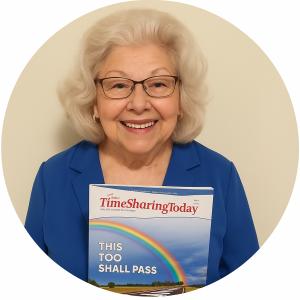Association Consultant Announces New Strategic Framework for Timeshare Owner Engagement
Lynne M. Kweder Releases Comprehensive Approach to Transform Resort Governance Through Active Owner Participation
Association consultant and board trainer Lynne M. Kweder has announced the release of a strategic framework designed to revolutionize how timeshare resorts engage owners in governance and decision-making processes. The methodology, developed through extensive research and practical application at resort properties, addresses the persistent challenge of connecting with geographically dispersed owners.
Framework Addresses Critical Industry Gap
The comprehensive approach responds to evolving regulations, advancing technology, and shifting owner expectations that have rendered traditional communication methods ineffective. Legacy resorts face mounting pressure to modernize their governance structures while maintaining operational excellence.
"The industry has reached a pivotal moment where change is not a threat—it's an invitation to build stronger, more sustainable resort communities," states Kweder. "Organizations that adapt by creating space for new voices and fresh ideas will thrive in the current environment."
Strategic Methodology Targets Key Owner Segments
The framework prioritizes engagement with two critical demographics: owners willing to provide feedback when invited, and retirees possessing time, talent, and motivation to contribute to resort improvement. This targeted approach maximizes resource efficiency while building sustainable participation pipelines.
Six-Point Implementation Strategy
The methodology encompasses six proven engagement strategies:
1. Purpose-Driven Meet-and-Greets
Structured social gatherings that combine community building with strategic feedback collection, creating informal yet effective forums for idea generation.
2. Direct Board Meeting Invitations
Personal outreach to owners during property visits, incorporating dedicated comment periods and systematic attendee tracking for future engagement opportunities.
3. Strategic Planning Retreats
Seasonal in-person gatherings utilizing small group discussions and collaborative planning sessions to develop long-term resort strategies.
4. Virtual Platform Integration
Comprehensive use of video conferencing for annual meetings and focused discussion groups, enabling participation from distant owners while maintaining engagement depth.
5. Advisory Committee Development
Creation of specialized committees for research, evaluation, and recommendation development, with virtual participation options expanding accessibility.
6. Board Development Committee Establishment
Dedicated committee structure for recruitment, orientation, succession planning, and overall leadership pipeline management.
Measurable Outcomes and Implementation Benefits
Resorts implementing the framework report significant improvements in owner satisfaction, board candidate availability, and governance effectiveness. The approach creates sustainable engagement systems that reduce recruitment challenges while strengthening organizational resilience.
Industry Application and Scalability
The methodology has been successfully tested across multiple property types and ownership structures, demonstrating broad applicability within the timeshare industry. Implementation requires minimal initial investment while delivering substantial long-term returns through improved owner relations and enhanced governance quality.
Implementation Resources Available
Kweder's framework includes detailed implementation guides, training materials, and ongoing consultation services to support resort boards in adopting these engagement strategies. The comprehensive approach ensures sustainable transformation rather than temporary improvements.
About Lynne M. Kweder
Lynne M. Kweder serves as an association consultant and board trainer specializing in timeshare resort governance. Former board president of Turtle Reef Condominiums I, Inc., Kweder brings extensive practical experience in organizational development and strategic planning to resort communities nationwide.
Shep Altshuler, Publisher
TimeSharing Today
+1 201-924-7435
staff|tstoday.com| |staff|tstoday.com
Legal Disclaimer:
EIN Presswire provides this news content "as is" without warranty of any kind. We do not accept any responsibility or liability for the accuracy, content, images, videos, licenses, completeness, legality, or reliability of the information contained in this article. If you have any complaints or copyright issues related to this article, kindly contact the author above.
Resource Design & Build, LLC Completes Renovation at 6477 Old Shadburn Ferry Road
Naples Soccer Academy Welcomes Peter Giannopoulos as Director of Security
Dino Days A Dinosaur Themed Train Ride Sept. 13th & 14th Phillipsburg, NJ
Więcej ważnych informacji
 Jedynka Newserii
Jedynka Newserii

 Jedynka Newserii
Jedynka Newserii

Konsument

Polacy nie korzystają z hossy trwającej na warszawskiej giełdzie. Na wzrostach zarabiają głównie inwestorzy zagraniczni
Od października 2022 roku na rynkach akcji trwa hossa, nie omija ona także warszawskiej giełdy. Mimo to inwestorzy indywidualni odpowiadają zaledwie za kilkanaście procent inwestycji, a o wzrostach decyduje i na nich zarabia głównie kapitał z zagranicy. Widać to również po napływach i odpływach do i z funduszy inwestycyjnych. Zdaniem Tomasza Koraba, prezesa EQUES Investment TFI, do przekonania Polaków do inwestowania na rodzimej giełdzie potrzeba zysków z akcji, informacji o tych zyskach docierającej do konsumentów oraz czasu.
Polityka
Obowiązek zapełniania magazynów gazu w UE przed sezonem zimowym ma zapewnić bezpieczeństwo dostaw. Wpłynie też na stabilizację cen

Unia Europejska przedłuży przepisy z 2022 roku dotyczące magazynowania gazu. Będą one obowiązywać do końca 2027 roku. Zobowiązują one państwa członkowskie do osiągnięcia określonego poziomu zapełnienia magazynów gazu przed sezonem zimowym. Magazyny gazu pokrywają 30 proc. zapotrzebowania Unii Europejskiej na niego w miesiącach zimowych. Nowe unijne przepisy mają zapewnić stabilne i przystępne cenowo dostawy.
Infrastruktura
Gminy zwlekają z uchwaleniem planów ogólnych zagospodarowania przestrzennego. Może to spowodować przesunięcie terminu ich wejścia w życie

Reforma systemu planowania i zagospodarowania przestrzennego rozpoczęła się we wrześniu 2023 roku wraz z wejściem w życie większości przepisów nowelizacji ustawy z 27 marca 2003 roku. Uwzględniono w niej plany ogólne gminy (POG) – nowe dokumenty planistyczne, za których przygotowanie mają odpowiadać samorządy. Rada Ministrów w kwietniu br. uchwaliła jednak ustawę o zmianie ustawy z 7 lipca 2023 roku, a jej celem jest zmiana terminu obowiązywania studiów uwarunkowań i kierunków zagospodarowania przestrzennego gmin na 30 czerwca 2026 roku. Wskazana data może nie być ostateczna z uwagi na to, że żadna z gmin nie uchwaliła jeszcze POG.
Partner serwisu
Szkolenia

Akademia Newserii
Akademia Newserii to projekt, w ramach którego najlepsi polscy dziennikarze biznesowi, giełdowi oraz lifestylowi, a także szkoleniowcy z wieloletnim doświadczeniem dzielą się swoją wiedzą nt. pracy z mediami.









.gif)

 |
| |
| |
|